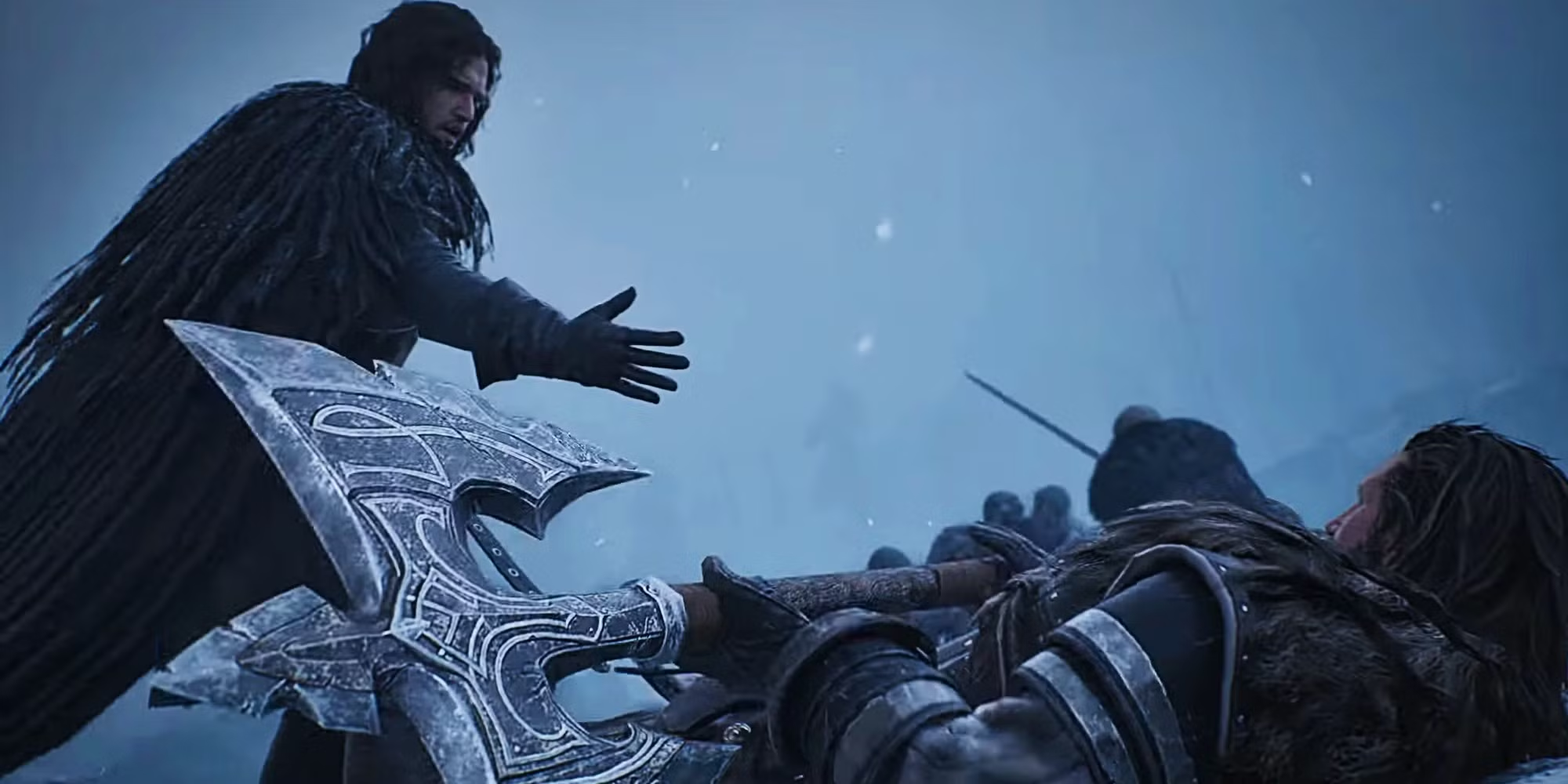In 55 days, Game of Thrones will finally return. And 35 days after that, Thrones will end. In less time than it seemingly took Littlefinger to zip around to every corner of Westeros, showrunners David Benioff and D.B. Weiss will deliver a conclusion to the story George R.R. Martin first introduced 23 years ago—and in that precious time they’ll have to answer half a hundred pressing questions: Who will live? Who will die? Who will tell Jon he’s doing it with his aunt?
Separate from those series-shaping questions are countless smaller but still crucial details that the show may or may not explore in the final season. These are Thrones’ loose ends: the characters, places, events, prophecies, and more that the story has made audiences wonder about over the past seven seasons but the show has yet to wrap up. In the run-up to the final season’s April 14 premiere, we’ll be digging through these loose ends, looking at why they matter and how they could affect the endgame as we count down to Thrones’s long-awaited conclusion.
The Loose End
Just as an author builds a 700-foot-high wall so it can eventually fall, he presumably gives a main character a kill list so she’ll tick off its names, one by one. For a half-dozen seasons now, Arya has been collecting names of those who have wronged her friends and family—and then discarding them with a sword or a dagger or a goblet full of poison. So before the series concludes, we have to know: Will she manage to check every name off her list?
Why This Loose End Matters
Arya’s list arrives relatively early in the show’s run, back in Season 2, when Yoren, a brother of the Night’s Watch, recounts his own history of repeating an enemy’s name every night before finally taking his revenge. Yoren describes the act as “a prayer, almost,” and Arya takes note. Yoren dies that very night—and Arya’s list begins.
Revenge soon becomes her most powerful motivating factor as she travels across continents, makes friends and enemies anew, and learns centuries-old secrets. As she explains to the actress Lady Crane in Season 6, someone who lost a loved one before being able to say goodbye “wouldn’t just cry. She would be angry. She would want to kill the person who did this to her.” That advice was autobiographical: It’s true of Arya with Ned, her father—but also Mycah and Lommy, her friends; Catelyn and Robb, her mother and brother; Syrio Forel, her water dancing instructor; and for a time Gendry, another friend, who wasn’t killed but was taken from her nonetheless.
Arya’s grudges add up into a lengthy list of potential victims. At one point on her wayward romp through the Riverlands with Sandor Clegane, Arya recites her list, as is her custom, and she and the Hound engage in a smattering of their characteristic banter:
Hound: Would you shut up?
Arya: I can’t sleep until I say the names.
Hound: The names of every fucking person in Westeros?
Arya: Only the ones I’m going to kill.
The Hound, somewhat mockingly, and unaware that she’s going to name him next, tells her to finish naming the members of “the list of doomed men,” but he’s not wrong in that assessment: Since she began counting off names of her enemies at night like a less traumatized child might count off sheep, Arya’s been a busy assassin. By Season 6, the Waif notes that Arya’s is now a “short list.”
By that point, she had killed Polliver at a tavern as the Hound clamored for chickens. She’d killed Rorge—just after adding him to her list—with a straight thrust of Needle to the heart. She’d killed Meryn Trant in Braavos. And she would soon kill Walder Frey, before massacring his entire lineage, with a touch of Faceless Men trickery after feeding him a helping of familial pie.
That killing spree—plus help from those responsible for Joffrey’s and Tywin’s murders—leaves Arya with just a couple remaining names after Season 7. One is Cersei, whom Arya blames for her complicity in Ned’s beheading, among other misdeeds, such as holding Sansa captive for years and conspiring to kill a direwolf way back in the second episode of Season 1. Another is the Mountain, Gregor Clegane, who partakes in brutalizing the prisoners at Harrenhal when Arya is held in that castle.
And then there are a few questionable cases. For a brief time, Arya included Melisandre and Beric Dondarrion (and the now-deceased Thoros of Myr) on her list for their treatment of Gendry, but she removed the trio from her nightly recitation despite not killing them. Ilyn Payne also disappeared off her list sometime before she arrived in Braavos. Maybe Arya forgave him because he simply followed Joffrey’s orders when he killed Ned, rather than acted of his own villainous volition—or perhaps the showrunners decided to remove him because Wilko Johnson, the actor who portrayed Ilyn, was diagnosed with cancer. (Despite since announcing he is cancer-free, Johnson hasn’t appeared on the show since Season 2.)
Back in Season 2, Jaqen H’ghar’s Faceless Men pitch to his future pupil includes the promise, “The girl has many names on her lips … names to offer up to the Red God. She could offer them all one by one.” Will Season 8 give her the chance to complete that quest?
How Season 8 Could Address It
She’ll have to travel, first of all. Such was her plan before impulsively heading north in Season 7 after learning from Hot Pie that the Starks had retaken Winterfell. Cersei hasn’t left King’s Landing since she returned there in the third episode of Season 1, and she won’t leave the southern capital city anytime soon with death descending on the North. The Mountain hasn’t left Cersei’s side since his resurrection, either, so Arya could kill two enemies with one stone (or sharpened blade) if she journeys south and returns to the city where her father died.
From Arya’s perspective, furthermore, it’s important that she do the deeds herself rather than rely on Dany’s dragons or other forces to kill her surviving enemies. She remarks with annoyance when she learns of Joffrey’s death: “At least I could have been there to watch. I wanted to see the look in his eyes when he knew it was over.” (She later delights in watching the theatrical reenactment in Braavos, and she tells Sansa, “I was angry when I heard someone else had done it.”) And as she kills Meryn Trant, she tells the Kingsguard knight, “I’ve gotten a few of the others. The Many-Faced God stole a few more from me. I’m glad he left me you.”
That broader theme has also emerged for Arya as she’s ticks off names: She doesn’t pursue revenge just for its own sake, but because she actually derives joy from the act. When the Hound asks what makes her happy, she has just one response: “Killing Polliver. Killing Rorge.” It’s easy to imagine that offing Cersei, the first name on her list, would bring her the greatest satisfaction of all.
It’s less clear if she’ll pursue the one-time members of the list—especially because, Ilyn aside, they’re now part of the Stark–Targaryen alliance. Beric fought with Jon beyond the Wall. Melisandre is, if not an actual quasi-adviser to Dany, at least a supporter of her cause, and although the red woman is now gallivanting around Essos, she told Arya when she left the Brotherhood Without Banners’ company way back in Season 3, “We will meet again.” (In that same conversation, she correctly predicts that Arya will close many eyes forever, so she knows of what she speaks.) When that fraught reunion arrives, will Arya remember her friend and seek revenge? Or will Gendry’s presumed presence with that group thaw her anger?
Arya’s treatment of the final member of the list she recites at the Hound’s side is evidence that she can evolve, after all. That member was the Hound himself, and though Arya threatens him with death, she doesn’t take the opportunity to kill him even when he begs her after losing a fight with Brienne. Perhaps she thought she completed her goal by leaving him to die, or perhaps she thought that depriving him of the quick death he wanted fulfilled even fiercer revenge—but the Hound survived and is back in the game, and as Arya admits in the House of Black and White, she wasn’t actually sure about his fate anymore. “He was not on her list anymore. She’d taken him off it,” she says. The Waif asks, “Didn’t she want him dead any longer?” and Arya replies, “She did and she did not.”
“She sounds confused,” the Waif continues, and Arya agrees: “Yes, she was.” Further confusion might stem from Arya’s reunion with her family: Before Season 7, she hadn’t seen Sansa since the middle of Season 1 or Bran since the beginning of that season, and Season 8 looks as if it will connect her to Jon, her favorite family member, for the first time in just as long. Arya’s first conversation with Sansa in Season 7, down in the Winterfell crypts, contained an eerie mix of her past and present identities—the former primarily defined as a proud Stark, the latter as a merciless assassin. Just as she talked with Sansa for the first time in years, with numerous journeys and tragedies dotting the interim, she mentioned her list, coldly noting, “However long my list got, [Joffrey] was always first.” Sansa asked about the list and Arya replied, “Of people I’m going to kill”—a sentiment reinforced later in the episode, when Bran mentions the list and Arya summarizes, “Most of them are dead already.”
On one hand, it’s easy to expect Arya’s single-minded motivation to continue to propel her character arc and choices as the show stretches toward its climax. Yet on the other, it’s also possible to foresee her Stark-ness muddle that plan, as she and Sansa continue to work together after fooling Littlefinger in Season 7’s finale, and as Jon, King in the North, re-enters her life. If the wolf pack sticks together, perhaps Arya will find a higher calling for her talents than simple revenge.
Disclosure: HBO is an initial investor in The Ringer.




















![[Book Review] The Blade Itself (The First Law Trilogy) by Joe Abercrombie](https://bendthekneegot.com/wp-content/uploads/2018/01/1516047103_maxresdefault-218x150.jpg)

















